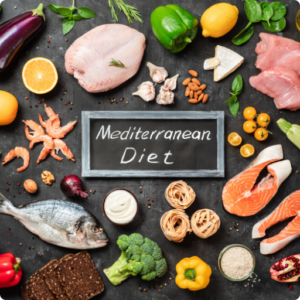What is the Mediterranean Diet?
The Mediterranean Diet is a way of eating inspired by the traditional dietary patterns of countries bordering the Mediterranean Sea, such as Greece, Italy, and Spain. It is renowned for its focus on whole, natural foods and its ability to promote overall health and well-being.
KEY POINTS
The Mediterranean Diet emphasizes fresh, unprocessed foods like fruits, vegetables, whole grains, lean proteins, and healthy fats, promoting balance and moderation as part of a sustainable lifestyle.
Rich in heart-healthy fats from olive oil, nuts, and fish, this diet reduces the risk of cardiovascular disease while supporting brain health, longevity, and weight management.
Its anti-inflammatory and nutrient-dense foods, such as leafy greens and legumes, help combat chronic conditions like diabetes and arthritis while boosting digestion and stabilizing blood sugar levels.
Unlike restrictive diets, the Mediterranean approach incorporates cultural traditions, mindful eating, and flexibility, making it enjoyable, adaptable, and highly effective for long-term health.

Pop in your email below, and we’ll zip it straight to your inbox so you never lose it!
Understanding the Mediterranean Diet
The Mediterranean Diet isn’t just about food—it’s a lifestyle. It emphasizes fresh, unprocessed ingredients, mindful eating, and communal meals. At its core, the diet promotes balance, variety, and moderation. Unlike restrictive fad diets, it encourages sustainable habits that are easy to maintain over time.
Looking to take control of your weight & nutrition?

Key Components of the Mediterranean Diet
According the the Cleveland Clinic, the Mediterranean Diet emphasizes plant-based foods and healthy fats. The Mediterranean Diet includes a variety of nutrient-rich foods that provide both flavor and health benefits:
- Fruits and Vegetables: The foundation of the diet, packed with vitamins, minerals, and antioxidants.
- Whole Grains: Brown rice, quinoa, and whole-grain bread serve as staple energy sources.
- Healthy Fats: Olive oil is a key ingredient, providing monounsaturated fats that support heart health.
- Lean Proteins: Fish, especially fatty varieties like salmon and sardines, along with poultry and eggs, are primary protein sources.
- Legumes and Nuts: Chickpeas, lentils, almonds, and walnuts add protein and healthy fats.
- Herbs and Spices: Used liberally to flavor dishes without excessive salt.
- Dairy: Cheese and yogurt are consumed in moderation.
- Red Wine: Enjoyed occasionally, in moderation, with meals.
How the Mediterranean Diet Differs from Other Diets
 What sets the Mediterranean Diet apart from many other dietary approaches is its flexibility and emphasis on whole foods rather than calorie counting or strict restrictions. It prioritizes quality over quantity and incorporates cultural traditions, such as sharing meals with loved ones. Unlike high-protein or low-carb diets, it offers a balanced approach that combines healthy fats, carbs, and proteins.
What sets the Mediterranean Diet apart from many other dietary approaches is its flexibility and emphasis on whole foods rather than calorie counting or strict restrictions. It prioritizes quality over quantity and incorporates cultural traditions, such as sharing meals with loved ones. Unlike high-protein or low-carb diets, it offers a balanced approach that combines healthy fats, carbs, and proteins.
The Mediterranean Diet’s focus on unprocessed, nutrient-dense foods makes it not only enjoyable but also highly effective in supporting heart health, reducing inflammation, and promoting longevity. Its adaptability and evidence-based benefits have earned it recognition as one of the healthiest diets in the world.
What Are the Health Benefits of a Mediterranean Diet?
What Are the Health Benefits of a Mediterranean Diet?
The Mediterranean Diet is often praised for its profound health benefits, making it a top choice among nutritionists and health experts worldwide. Rooted in wholesome, natural ingredients, this way of eating supports both physical and mental well-being while promoting long-term health.
Heart Health
One of the standout benefits of the Mediterranean Diet is its ability to improve cardiovascular health. The diet’s emphasis on heart-healthy fats like olive oil, omega-3-rich fish, and nuts helps reduce bad cholesterol (LDL) and increase good cholesterol (HDL). Studies have shown that it can significantly lower the risk of heart disease and stroke.
Supports Weight Management
Unlike restrictive diets, the Mediterranean Diet focuses on balance and moderation, making it easier to maintain a healthy weight. Its reliance on fiber-rich fruits, vegetables, and whole grains helps keep you full and satisfied, reducing the likelihood of overeating or snacking on unhealthy foods.
Reduces Inflammation
The Mediterranean Diet is packed with anti-inflammatory foods such as olive oil, nuts, and leafy greens. These foods help combat chronic inflammation, which is linked to conditions like arthritis, diabetes, and heart disease.
Improves Brain Health
The inclusion of healthy fats, antioxidants, and whole grains in the Mediterranean Diet supports cognitive function and reduces the risk of neurodegenerative diseases like Alzheimer’s. The diet’s focus on nutrient-dense foods also promotes better memory and mental clarity.
Promotes Longevity
People who follow the Mediterranean Diet tend to live longer, healthier lives. Its nutrient-rich, plant-forward approach is linked to reduced mortality rates and a lower risk of chronic illnesses.
Balances Blood Sugar Levels
The fiber-rich fruits, vegetables, and legumes in the Mediterranean Diet support a healthy gut microbiome, aiding digestion and preventing issues like constipation.
With its versatile, flavorful, and sustainable approach to eating, the Mediterranean Diet not only satisfies the palate but also provides a wealth of health benefits that make it a powerful tool for overall well-being.
How to Create a Mediterranean Diet Meal Plan?
Creating a Mediterranean Diet meal plan is simple, delicious, and packed with health benefits. It emphasizes fresh, whole foods and a balance of lean proteins, healthy fats, and nutrient-dense carbohydrates. Here’s how to craft a sustainable Mediterranean meal plan that fits into your lifestyle.
Sample Meal Plan for a Week
Here’s a sample week of Mediterranean-inspired meals to get you started:
Day 1:
- Breakfast: Greek yogurt with fresh berries, honey, and a sprinkle of walnuts.
- Lunch: Greek salad with cucumbers, tomatoes, olives, feta cheese, and olive oil.
- Dinner: Grilled salmon with a side of quinoa and steamed asparagus.
Day 2:
- Breakfast: Whole-grain toast with avocado, cherry tomatoes, and a poached egg.
- Lunch: Lentil soup with a slice of whole-grain bread.
- Dinner: Chicken souvlaki with a side of roasted vegetables.
Day 3:
- Breakfast: Oatmeal topped with sliced almonds, bananas, and a drizzle of olive oil.
- Lunch: Hummus and whole-grain pita with mixed raw veggies.
- Dinner: Baked eggplant with a tomato-based sauce and a side of couscous.
Day 4-7:
Continue incorporating a variety of lean proteins like fish and legumes, healthy fats from nuts and olive oil, and plenty of fruits and vegetables. Rotate dishes to maintain variety and excitement in your meals.
Incorporating Mediterranean Foods into Your Daily Routine
- Start with Breakfast: Swap sugary cereals for oatmeal, whole-grain toast, or Greek yogurt.
- Lunch Ideas: Add fresh salads with olive oil-based dressings or whole-grain wraps filled with grilled chicken and veggies.
Snack Smart: Choose nuts, fresh fruits, or hummus with raw vegetables instead of processed snacks.
- Focus on Dinner: Center your evening meals around lean proteins like fish or poultry, paired with whole grains and a variety of roasted or steamed vegetables.
Tips for Meal Prep on the Mediterranean Diet
- Plan Ahead: Write out a weekly menu and grocery list to avoid last-minute unhealthy choices.
- Batch Cook: Prepare staples like quinoa, brown rice, or roasted vegetables in advance for easy meal assembly.
- Portion Snacks: Divide nuts, seeds, and dried fruits into single-serving portions for convenience.
- Invest in Quality: Use high-quality olive oil and fresh, seasonal ingredients for the best flavor and nutritional value.
By combining these tips with a variety of Mediterranean-inspired dishes, you can create a meal plan that is not only healthy but also enjoyable and easy to stick to. Embrace the Mediterranean way of eating and enjoy the flavors and health benefits it brings!
What Are the Risks and Considerations of the Mediterranean Diet?
According to the Mayo Clinic, following a Mediterranean diet may help reduce the risk of cardiovascular disease and type 2 diabetes. This eating plan emphasizes plant-based foods, healthy fats like extra virgin olive oil, and moderate consumption of dairy products while limiting red meat and highly processed foods. The American Heart Association supports this healthy diet due to its focus on plant-based foods and healthy fats that can lower risk factors.
Research, including systematic reviews and meta-analyses, highlights the health benefits of the Mediterranean diet, particularly in Mediterranean countries. The Mediterranean diet pyramid encourages the consumption of plant foods and fatty acids, supporting adherence to a Mediterranean-style diet. A vegetarian diet can also align with these principles, promoting a balanced approach to nutrition. Overall, the Mediterranean diet may serve as a sustainable choice for those seeking improved health.











